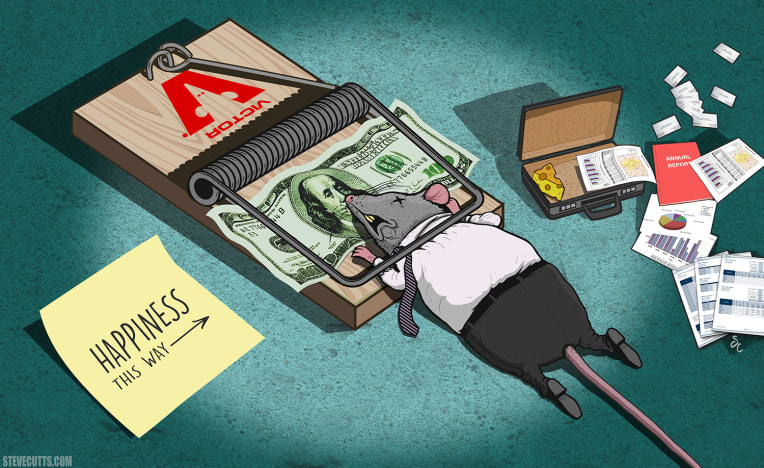|
This wonderful blog post from the School of Life (see below) talks about the problems with the technology-rich, instant-gratifying world we live in today. Steven Pinker believes that there is no better time to be alive and it’s really hard to disagree with him. People are living longer, they are healthier and have access to an abundance of resources that might seem like a fantasy to someone living just a few hundred years ago. Why is it then that our happiness hasn’t trended the same way as everything else? It turns out, unsurprisingly, that humans are complex creatures who cannot simply be won over with material possessions. The industrial revolution showed us early on that having the means of production and consumption rarely translate into immediate happiness for everyone. Factory workers felt exploited and resented the owners and managers for doing it even though they were making way more than on the farm. Things haven’t changed much since the industrial revolution. Most people still struggle with finding meaning in their jobs. Although we make more money and have more stuff, it just leads us to get more frustrated because WE SHOULD be happier, right? We have little to complain about and yet, here we are. To make matters worse, the internet now knows what you’re into and constantly reinforces your beliefs. It’s easy to get stuck in a loop seeing the things you believe constantly popping up on the screen. This is affectionately known as the Instagram effect (getting bombarded with pictures of beautiful people and places makes us feel ugly and boring). The answer to our modern problems might be found in the thinking of the ancient philosophers. Aristotle, Plato and the Stoics that followed them spent a large portion of their time thinking about Virtue (yes capital ‘V’ virtue) and the trouble with achieving it. The Stoics placed their bets with the virtues: Wisdom, Courage, Justice, and Self-Discipline. They believed that the way forward was through the self. Today it’s much easier to speak your mind with an attempt to change other people’s behaviours instead of blaming ourselves as the Stoics would suggest. Once you realize that you’re in control of your life (more than you realize), it becomes much easier to confront the challenges you face daily. Take time to write down your goals and your faults. Figure out what you can fix up in your life in the short term. Most importantly, make a concerted effort to be a little bit better than you were yesterday. The road to happiness isn’t through stuff - it’s through the management of yourself. Why the World is Broken For those of us lucky enough to live through the early 21st century, when unprecedented advancements in medicine, agriculture and technology have rendered many of the evils of the past obsolete, the question remains: why are we still so miserable? If, as the scientists and academics tell us, our present age is the best possible time to be alive, why do so many yearn to return to an imagined (and illusory) past, whilst others look ahead with horror at a chaotic and doom-laden future? Despite what the Panglossians* say, we are right to suspect that all is not right with the world. Along with its manifest benefits, modernity has created societal divisions and psychological strains that stem (ironically enough) from its leading, profoundly optimistic ideas: that life can be made perfect; that progress is inevitable; that everyone is equal and capable of greatness. When reality proves these false, the result is widespread rage, misery and a loss of hope. We should never seek to return to the conditions of the past, but we should try to reclaim some of its outlook - less hopeful, more fatalistic, but better suited to the vagaries of the present. Comments are closed.
|
Time to reinvent yourself!Jason WoodScience teacher, storyteller and workout freak. Inspiring kids to innovate. Be humble. Be brave. Get after it!
|







 RSS Feed
RSS Feed